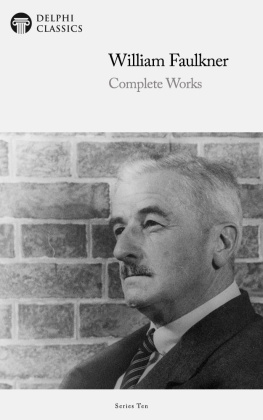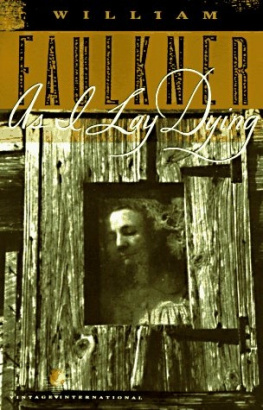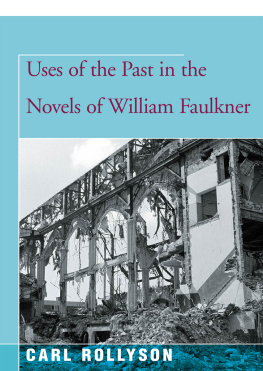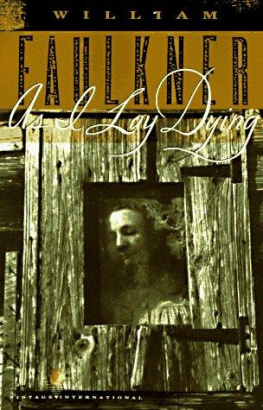Books by Joseph Blotner
The Political Novel
The Fiction of J. D. Salinger (with Frederick L. Gwynn)
Faulkner in the University (with Frederick L. Gwynn)
William Faulkneri Library: A Catalogue
The Modern American Political Novel: 19001960
Faulkner: A Biography (2 vols.)
Selected Letters of William Faulkner
Uncollected Stories of William Faulkner
Faulkner: A Biography (I vol.)
Robert Penn Warren: A Biography
FAULKNER
A Biography
FAULKNER
A Biography
ONE-VOLUME-EDITION

Joseph Blotner

www.upress.srate.ms.us
The University Press of Mississippi is a member
of the Association of American University Presses.
Copyright 1974, 1984, 2005 by Joseph Blotner
First published in 1974 by Random House, Inc.
All rights reserved
Manufactured in the United States of America
07 06 05 4 3 2 1
Grateful acknowledgment is made to the following for permission to reprint material from previously published works:
International Famous Agency: For excerpts from Interview with William Faulkner by Cynthia Grenier, published in Accent, Vol. 16, Summer 1956. Copyright 1956 by Accent.
Liveright Publishing Corporation: For excerpts from Soldiers Pay by William Faulkner. Copyright renewed 1953 by William Faulkner. For excerpts from Mosquitoes by William Faulkner. Copyright 1954 by William Faulkner.
Harold Ober Associates, Inc.: For excerpts from Letters of Sherwood Anderson, selected and edited by Howard M. Jones. Copyright 1953 by Eleanor Anderson. Copyright renewed 1981 by Eleanor Copenhaver
Anderson.
Purdue Research Foundation: For excerpts from Conversation with William Faulkner, Vol. V, Number 4,
Modern Fiction Studies, Winter 1959-1960. Copyright 1960 by Purdue Research Foundation, Lafayette,
Indiana.
Random House, Inc.: For selections from the copyrighted works of William Faulkner, published by
Random House, Inc.
Saturday Review. For excerpts from William Faulkner: That Writin Man of Oxford by Anthony Buttitta,
Saturday Review of Literature, May 21, 1938.
Trident Press, a division of Simon and Schuster, Inc.: For excerpts from My Brother Bill by John Faulkner.
Copyright 1963 by Lucille Ramey Faulkner.
The Viking Press, Inc.: For excerpts from The Faukner-Cowky Filc Letten and Memovics, 19441962 by
Malcolm Cowley. Copyright 1966 by Malcolm Cowley, copyright 1966 by the Estate of William
Faulkner. All rights reserved. For an excerpt from Writers at Work: The Paris Review Interviews, edited by
Malcolm Cowley. Copyright 1957, 1958 by The Paris Review, Inc.
Acknowledgment is also made to the following:
L. D. Brodsky: For passages from Faukner: A Comprehensive Guide to the Brodsky Collection, eds. Louis Daniel Brodsky and Robert W. Hamblin.
Lee Morris: For passage from William Faulkner: A Life on Paper, ed. Ann Abadie.
University Press of Mississippi: For passages from Count No Count: Flashbacks to William Faulkner by Ben Wassan.
Meta D. Wilde: For passages from A Loving Gentleman: The Story of William Faulkner and Meta Carpenter by Meta Carpenter Wilde and Orin Borsten, New York: Simon and Schuster, 1976.
Library of Congress Cataloging-in-Publication Data Blotner, Joseph Leo, 1923
Faulkner: a biography I Joseph Blotner.
p. cm.
Originally published: New York : Random House, 1974.
Includes bibliographical references (p.) and index.
ISBN 1-57806-732-4 (pbk. : alk. paper)
I. Faulkner, William, 1897-1962. 2. Novelists, American20th centuryBiography. I. Title.
PS3511.A86Z63 2005
British Library Cataloging-in-Publication Data available
For Nancy Wright Blotner, 19562004
Foreword

THIS book was written to do two things: to provide a condensation of the two-volume Faulkner: A Biography so as to make its essence available to a wider audience, and to bring that account up to date by incorporating material from the enormous outpouring since then of scholarship, criticism, and other writings, including posthumously published Faulkner works.
For a fuller account of various aspects of William Faulkners life and work, the reader is referred to the two-volume version of 1974
The notes to this book provide references to all material quoted from published sources and to all interviews conducted since 1974. For the names and dates of earlier interviews that were also used in the two-volume edition, scholars and other interested readers are referred to that edition, where all such data are provided in full and may be located chronologically in both the text and the notes.
This edition has afforded the opportunity to correct earlier errors, and where it differs, should be regarded as presenting the best information now available. It is not just different from its predecessor of a decade ago; it is to some extent a new book. Almost all of it has been rewritten, and though it, too, generally follows chronological order, it does so less rigorously. In the intervening years four works by Faulkner have appeared: The Marionettes, Mayday, Sanctuary: The Original Text, and completed a biography of her father, Dean Faulkner, as her M.A. thesiswhich changed my view of him, based though it had been on interviews with a number of friends and relatives. Joan Williams published an essay on her relationship with Faulkner, and Susan Snell completed a full and careful doctoral dissertation in the form of a biography of Phil Stone. Meta Carpenter Wilde, who had declined to be interviewed when I was doing the research for Faulkner, wrote, with Orin Borsten, A Loving Gentleman, and has kindly permitted me to quote from it.
New collections of Faulkner letters became available in the Tulane University Library and the New York Public Library. Three new catalogues of the contents of rich Faulkner collections appeared. Two complete bibliographies of Faulkner criticism were published, as well as many books of criticism, including several on individual Faulkner novels. As I was finishing this book, I read (through the kindness of their publishers) two new studies then in proof. The annual Faulkner number of The Mississippi Quarterly continued, to be joined as a fixture in the Faulkner research field by the publication in book form of papers given at the Faulkner Symposium held each summer at the University of Mississippi. All of these materials became available, some demanding to be used in this new book. The authors quoted are all identified in the notes. I should mention at least one new interview. I finally was able to see William Faulkners Aunt Sue, the wife of John Wesley Thompson Falkner, Jr. She had been sick during the times when I was working on Faulkner, and on one of my later visits to Oxford, my friend Jimmy Faulkner took me to see her. So that went into this book too.
To some extent I have used Faulkner as I had hoped others would use it, and have used it, in books on William Faulkner published since 1974. There is proportionally more criticism, mine and other peoples, in this book. Some of it will serve, perhaps, to balance the assessments of Faulkner works as they were made during his life, assessments often short-sighted and downright wrong, but presented here to show what his career was like as he strove to perfect his art, and make a living. As he said of his characters in his Foreword to
Next page











